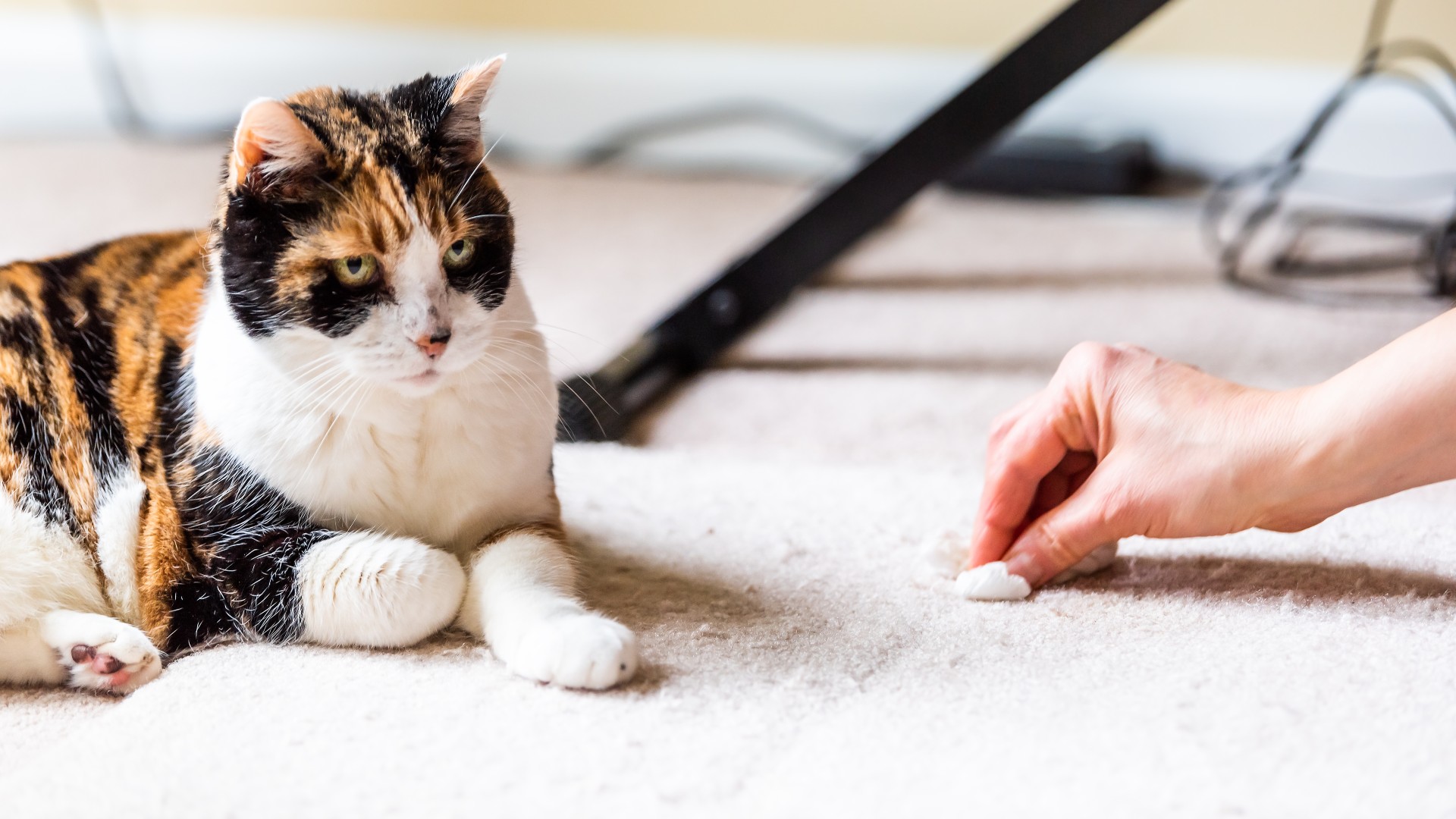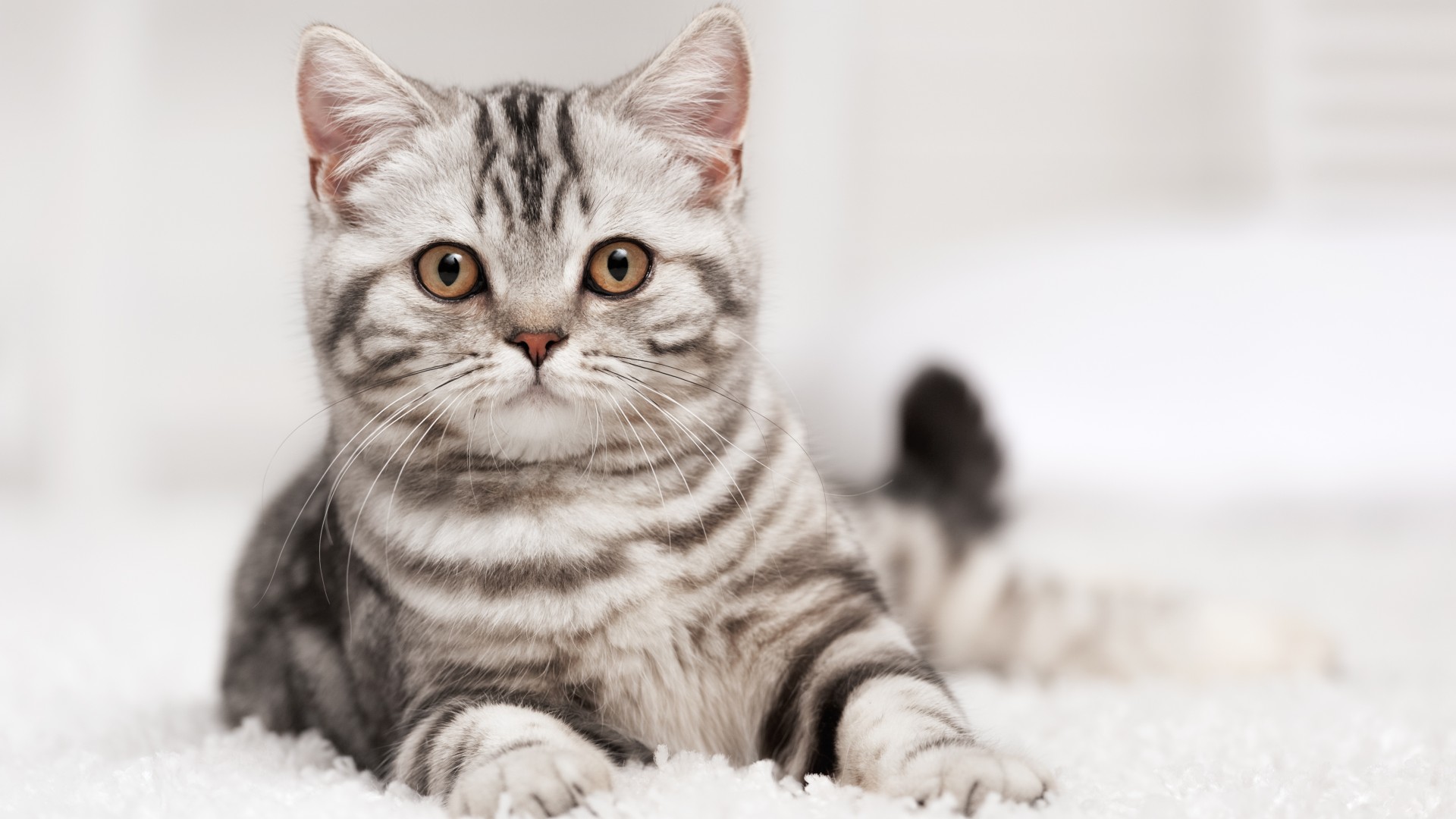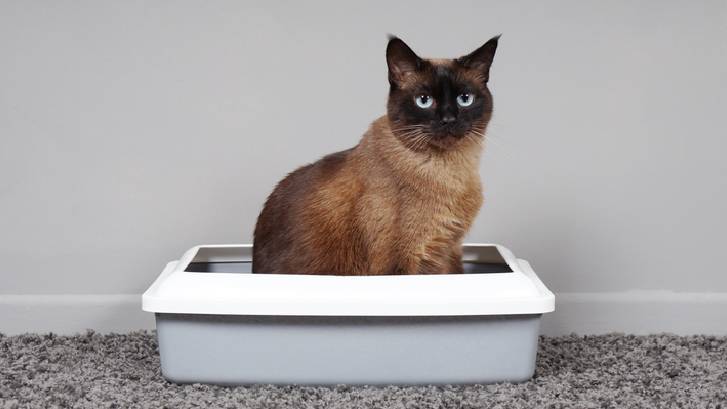How to stop your cat peeing on the carpet
Wondering how to stop your cat peeing on the carpet? From switching their litter to reducing stress, we reveal our top tips.

How to stop your cat peeing on the carpet is likely top of your priority list right now if you’re one of the many pet parents who have had the unpleasant experience of making your way bleary-eyed to the kitchen for your morning cup of coffee only to step in a fresh, and very wet, patch of urine along the way.
If your feline friend is being fed the best cat food, has an array of toys to play with, a cozy bed to snuggle up in and access to their very own litter box, you may be wondering why on earth they’ve decided to pay you back for all your good deeds by urinating on your carpet.
It can be one of the most frustrating parts of owning a cat, but rest assured your beloved bundle of fluff doesn’t mean to cause you extra work or stress. There are a range of reasons why our kitty companions may choose to pee outside their litter box, from an underlying medical condition to feeling stressed about changes in their environment.
Cat communication is complex, but peeing on the carpet is one way they can express to you that they’re feeling stressed or unhappy about something that’s going on either in or around them. Once you know why they’re behaving the way they are, you can figure out the best way of putting a stop to it.
Below, we walk you through the most common reasons why your cat is peeing on the carpet and provide you with our top tips on how to get them doing their business back in the litter box where it belongs. Check out our guide to how to get rid of cat pee smell around the home or read on to find out how to save your carpets – and your sanity!
Why is my cat peeing on the carpet?
While it’s understandably very upsetting to be finding cat pee around your home, it’s important to keep in mind that your feline friend isn’t deliberately trying to upset you – or cause you extra work.
Instead, peeing on the carpet (or anywhere else outside of their litter box) is your cat’s way of trying to get your attention and let you know that something is going on that’s causing them distress.
Get the best advice, tips and top tech for your beloved Pets
Some of the most common reasons a cat may pee on the carpet include:
1. Underlying medical conditions
There are a range of health issues that can cause cats to urinate outside of their litter box, such as a urinary tract infection, kidney disease, arthritis, hyperthyroidism, and diabetes.
If you’ve noticed changes in your cat’s toileting routine, we recommend you make an appointment with your vet who will be able to run some tests and determine whether a medical condition could be the reason.
2. A new cat in the home
Cat’s are complex creatures and while they’re social by nature, just like us humans, they’re not going to get along with every cat they meet. A new cat that your current kitty is unsure about may trigger a stress response that results in them peeing on the carpet.
In addition to possible stress and anxiety cats have lots of different ways of leaving messages for each other and urination is one of these. Urinating outside of the litter box when a new cat enters the home is their way of communicating vital pieces of information to the newest addition to the family.
“By urine marking, a cat tells other cats of his presence and makes a statement about such things as what piece of property is his, how long ago he was in the area and, over time, when other cats can expect him to return,” the ASPCA explains.
3. Marking territory
Once a cat reaches maturity, it will typically start marking its territory either by spraying, scratching or rubbing up against objects to leave their scent. Peeing on the carpet may be your cat’s way of letting other felines know that this is their space or to make a particular area feel more familiar and thus safer.
4. Changes to routine
Are you currently renovating your home or have recently moved into a new house? Do you have guests staying? Have you moved your cat’s litter box or food? Cats are creatures of habit and any change, no matter how small it may seem, can be enough to cause unhappiness.
Cats don’t do particularly well with having their routines disrupted and are likely to experience feelings of stress and anxiety if things in their environment are suddenly different. Peeing on the carpet is one way they may signal to you that they’re finding the changes upsetting.
5. A problem with the litter box
Fastidious when it comes to their own personal hygiene, a cat will refuse to use their litter box if it isn’t cleaned and changed regularly. They may also choose to pee on the carpet if their box isn’t big enough, they don’t approve of the location you’ve placed it in or if they don’t like the type of cat litter you’ve chosen.
How to stop your cat peeing on the carpet

Now that we know a little bit more about the reasons your beloved bundle of fluff may be choosing to pee on your carpet, let’s take a look at some simple ways you can put a stop to this unwelcome behavior.
1. Clean up the mess thoroughly
One of the easiest things you can do to stop your cat peeing on the carpet is to ensure you clean up their mess and eliminate the odor to prevent them from being drawn back to the same spot.
First up, blot up any excess urine that the carpet hasn’t yet absorbed and then apply an enzymatic or bacterial cleaner to get rid of the stain and smell.
This second step is key as cats have very strong olfactory senses and a lingering odor can encourage them, and any other cats in the home, to keep repeating the behavior.
2. Reduce conflict between your cats
If you’ve recently introduced a new feline friend into your family, your current cat’s inappropriate urination may be the result of anxiety. As well as potentially feeling unsure about this latest addition, your beloved bundle of fluff may also be experiencing stress around having to share resources.
To help reduce peeing on the carpet that may be a result of a new furkid entering the home, check out our guides to how to introduce a kitten to a cat for some useful tips on how to make the transition as smooth as possible.
On the resource front, make sure that each cat has their own food and water bowl, as well as their own litter box as this will help to minimize some of the distress your kitty might be feeling over having to share their belongings - a happy and settled cat is one who’s far less likely to pee on your carpets.
3. Find the right type of litter box
While those fancy enclosed self-cleaning litter boxes may blend beautifully with your home decor, contain your cat’s mess and the accompanying unpleasant odor, and make your life easier, they’re not always going to get the paws up from your fur friend.
A lot of cats dislike doing their business in small, dark spaces, and if the litter box has high sides or a small entrance, your kitty may also struggle to get in and out, especially if they’re older or have arthritis.
If you’re finding that your furkid is peeing on your carpets, try changing their litter box - we recommend one that’s open with low sides as this will also make it easy for your cat to turn around in. Check out our guide to the best cat litter box for inspiration.
4. Switch the litter
Finding the best cat litter for your feline friend may take some time as every kitty has their own likes and dislikes when it comes to the type of material they’re prepared to do their business in.
Sometimes, peeing on the carpet is your furkid's way of saying that there’s something about the litter in their box that they’re not happy about. Perhaps it’s too strongly scented, the crystals end up stuck in their paws, or it doesn’t clump.
Whatever the reason, cat’s will urinate outside their litter box when they’re seeking a more comfortable spot than what’s currently being provided for them, so try switching up their litter and see if that makes a difference.
If you’re unsure which cat litter to buy, studies have shown that the majority of cats prefer an unscented, clumping clay litter that contains activated charcoal, so it’s well worth starting there.
5. Consider the location of the litter box

You can provide your beloved bundle of fluff with the best litter box and type of litter that money can buy, but if it’s in the wrong spot, they’ll still choose to pee on your carpet instead. That’s because, just like us humans and our houses, when it comes to the perfect litter box, it’s all about location, location, location.
It’s important to keep your cat’s litter box away from noisy areas that they may find scary or unsettling - think the laundry room where the washing machine is or close to loud pipes or places prone to heavy traffic, like the bathroom. You also want to avoid tucking the litter box away into a tight corner or anywhere else that’s not convenient for your kitty to get to.
If your cat is peeing on one particular spot on your carpet, temporarily place their litter box over that spot to encourage them to use it and then slowly move it to a quiet place within your home that is easy for them to get to. For multi-level homes, place a litter box on each floor to make it convenient for your cat to do their business.
6. Clean the litter box frequently
The clean freaks of the animal kingdom, cats spend a whopping 30 to 50 percent of their waking hours grooming themselves - no wonder their coats look so pristine!
Not only do our feline friends loathe being dirty, they also dislike having to do their business somewhere that’s not clean. If their litter box isn’t up to their fastidious hygiene standards, they’ll happily trot off and look for a spot in the house that is.
That’s why it’s super important to regularly clean your cat’s litter box if you want to stop them peeing on the carpet.
Scoop their litter box once a day to remove clumps of urine and waste and do a deep clean once a week where you wash the box with warm, soapy water and fill it with fresh litter.
7. Reduce your cat’s stress levels
As we saw above, stress and anxiety are common reasons why your cat may choose to urinate outside of their litter box, so being mindful of this and taking steps to reduce the stress your feline friend is experiencing can go a long way to putting a stop to this behavior. Any kind of change in their environment, whether minor or major, can cause your cat stress and this stress affects their urinary tract.
Whether you have guests staying, are doing renovations, or it’s the holiday season and there’s a lot of fireworks and other noise around, there are things you can do to help make life easier for your kitty.
Firstly, make sure their litter box is in a quiet location where they can do their business in peace. It’s also worth creating a calming and safe space for your feline friend in a low-traffic area of your home that’s away from any chaos. Invest in one of the best cat beds, furnish it with a cozy blanket and pop in a favorite toy.
If your cat is highly anxious, we recommend trialing a calming aid that’s been specifically designed for our feline friends, such as Feliway. This clever device mimics the pheromones released by cats to help reduce feelings of stress and anxiety.
You may also find these articles useful: Why is my cat peeing outside the litter box? or how to stop a cat from peeing in the house

Kathryn is a freelance writer who has been a member of the PetsRadar family since it launched in 2020. Highly experienced in her field, she's driven by a desire to provide pet parents with accurate, timely, and informative content that enables them to provide their fur friends with everything they need to thrive.
Kathryn works closely with vets and trainers to ensure all articles offer the most up-to-date information across a range of pet-related fields, from insights into health and behavior issues to tips on products and training.
When she’s not busy crafting the perfect sentence for her features, buying guides and news pieces, she can be found hanging out with her family (which includes one super sassy cat and a kitten), drinking copious amounts of Jasmine tea and reading all the books.
She has written for a range of publications, including Fit&Well, Top Ten Reviews, LiveScience, Goodto, and Product Hunt.
